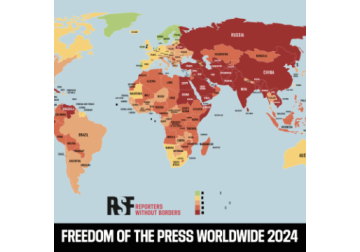
Moldova has dropped 3 places in the World Press Freedom Index.
According to the World Press Freedom Index 2024, this year Moldova ranked 31st out of 180 with an index of 74.86, dropping by 3 positions over the year (in 2023, Moldova ranked 28th out of 180 with an index of 77.62). The study, compiled by the international organization Reporters Without Borders, says that Moldova's media outlets are divided into pro-Russian and pro-Western camps, with oligarchs and political leaders strongly influencing their editorial stance. Like the country itself, the media landscape is polarized and marked by the influence of Ilan Shor, a pro-Kremlin oligarch who is on the run to avoid prosecution on corruption charges. The media empire built in recent years by companies linked to Shor has been weakened by the suspension of the licenses of 6 channels, including TV6 (in December 2022) and Orizont TV (in November 2023). The licenses of 4 channels associated with another fugitive oligarch, Vladimir Plahotniuc, were also suspended in November 2023. The report notes the political context of the license suspensions. Thus, the state of emergency introduced due to Russia's invasion of Ukraine was used by the authorities to suspend the licenses of several TV channels on the eve of the 2023 elections without proper transparency of the grounds for such a decision. The measures taken by the Broadcasting Council tightened control over disinformation and hate speech and weakened media outlets broadcasting propaganda content produced in Russia. It is noted that in Moldova, press freedom and the right to information are guaranteed by law, and best practices are encouraged by a code of journalistic ethics. But access to information is sometimes undermined and arbitrary libel suits are not uncommon. "Of concern are the rapid and opaque changes in legislation at the end of 2023 to block channels whose license was suspended during the state of emergency," the study notes. It is emphasized that independent media are under-resourced and financially strained. They struggle to hire qualified staff capable of providing quality work, and many turn to foreign donors for financial support. As for the socio-cultural environment, it rarely hinders journalists from doing their work, but some topics, such as war, are sensitive - their coverage can lead to self-censorship, as well as media discrimination on ethnic, religious or gender grounds. Another criterion assessed by the report's authors relates to safety. It is noted that journalists can be subject to insults and intimidation by politicians. Their supporters sometimes resort to cyber harassment of reporters they consider hostile to their ideas. Journalists' access to Transnistria, a separatist eastern province backed by Russia, is subject to special accreditation. The top ten leading countries this year included: Norway, Denmark, Sweden, the Netherlands, Finland, Estonia, Portugal, Ireland, Switzerland, Germany. The most unfree media are in Iran, North Korea, Afghanistan, Syria, and Eritrea. The Press Freedom Index is considered an indicator of the degree of freedom that journalists and information organizations, including print, broadcast and online media, enjoy in a country. The organization's experts draw conclusions about the state of media freedom on the basis of 43 indicators. // 03.05.2024 - InfoMarket.







